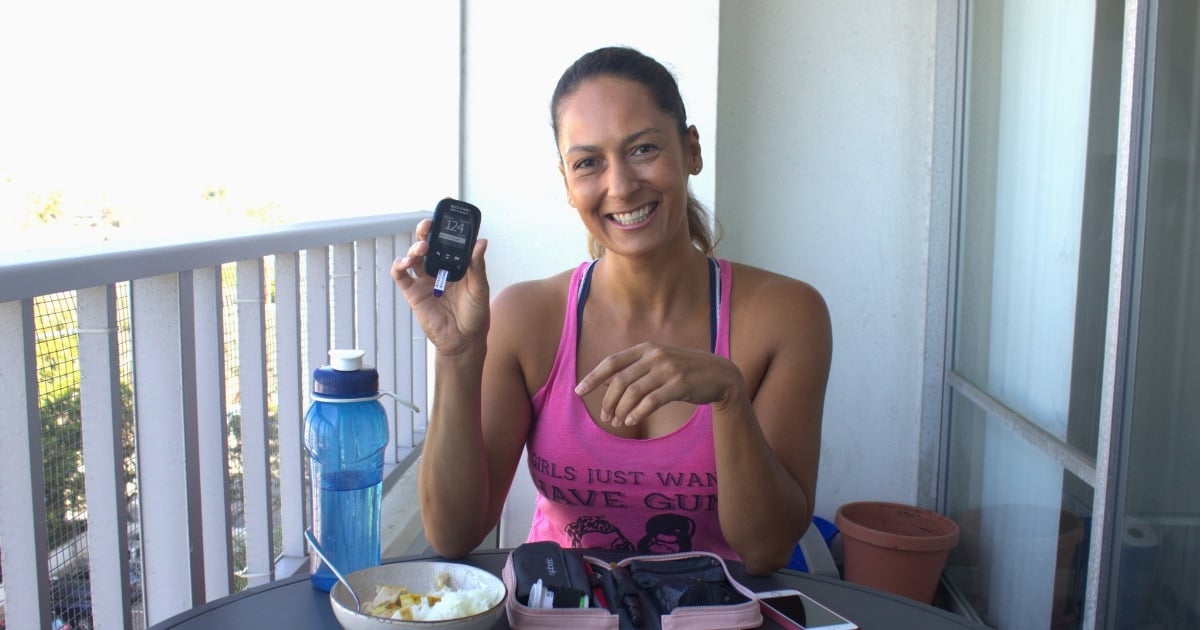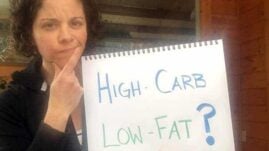Is a no-carb, low-carb, or moderate-carb diet the best choice for someone living with diabetes?
This is a question I’m asked almost daily, and today I will try to answer it by sharing my experiences with all three diet types.

What is the best diabetes diet?
Before I jump into the different diets, let’s get the obvious answer out of the way: It depends.
The diet that is best for you will always be determined by your health goals, activity level, weight, and other factors. The diet that works for you might not work for me, and vice versa.
For example, if you are trying to build strength and muscles, you shouldn’t follow the same diet as if you are trying to lose weight.
Similarly, someone who runs every day has different dietary requirements than someone who sits in an office all day and doesn’t exercise.
Your healthcare provider or a registered dietitian (RD) can help you determine what sort of dietary approach is best for you and your diabetes management.
Now that we have that out of the way, let’s get into the details of the different diets!
The “no-carb” (ketogenic) diet
The ketogenic diet (“keto”) is typically defined as including fewer than 50 grams of carbohydrate per day, with a focus on high-fat and moderate-protein foods.
The theory behind this eating approach is that by consuming very few carbs (contributing to around 5 to 10 percent of your total calories), your body will start converting fat into fatty acids and ketones.
Ketones can replace glucose as your body’s main energy source, meaning that your body mainly relies on fat for energy. In theory, this should make it very easy to lose excess body fat if you limit your calorie intake at the same time.
Because you eat almost no carbs, you also, in theory, need very little insulin, making blood sugar control easier. (Carbohydrate is the main nutrient that affects blood sugar levels.)
Foods recommended on the keto diet
Some sample foods recommended for this diet include:
- Meats (e.g., beef, pork, lamb, poultry, and game meats; preferably grass-fed and organic, if possible)
- Fatty fish (e.g., salmon, mackerel, sardines, trout, and other fish rich in omega-3 fatty acids)
- Eggs (preferably free-range or omega-3-enriched eggs)
- High-fat dairy (e.g., butter, cream, and certain cheeses)
- Nuts and seeds (e.g., almonds, walnuts, flaxseeds, pumpkin seeds, chia seeds)
- Healthy oils (primarily extra-virgin olive oil, coconut oil, and avocado oil)
- Avocados (whole avocados or freshly made guacamole)
- Low-carb vegetables (e.g., green veggies, tomatoes, onions, peppers)
- Condiments (e.g., vinegar, mustard, hot sauce, garlic, herbs, and spices)
- Beverages (e.g., water, unsweetened coffee and tea)
A registered dietitian can help you determine the best balance of foods to eat, taking into consideration your lifestyle and overall health goals.
My experience on the diet
So, what has my experience with the keto diet been? Unfortunately, it did not work for me at all! I only had 20 grams of carbs per day, and my insulin sensitivity went bonkers.
Since fat is released more slowly into the bloodstream than complex or refined carbs, I didn’t see any crazy blood sugar fluctuations, but my insulin needs increased dramatically compared to when I was eating a low-carb or moderate-carb diet.
Needless to say, my experience with the ketogenic diet was that I gained weight rapidly. Not really what I was going for.
My blood sugars were nice and stable, although often trending high. But since gaining fat isn’t part of my goal, I can honestly say that I will most likely never try a ketogenic diet again.
I know that some people successfully follow a ketogenic diet for diabetes management, so my experience may not be typical, but I cannot recommend a ketogenic diet at this point. You don’t need it for good blood sugar management, and the downsides can be serious.
(In addition to the issues I experienced, risks of this diet can include hypoglycemia [low blood sugar] for those on insulin or drugs that promote the release of insulin, nutrient deficiencies, kidney stones, acceleration of kidney damage for those with kidney disease, and constipation.)
The low-carb diet
There is currently no standard, universally accepted definition of a low-carb diet, but most resources define it as less than 26 percent of total calories daily or less than 130 grams of carbs daily
Foods recommended on a low-carb diet
Some sample foods recommended for this diet include:
- Non-starchy vegetables (e.g. leafy greens, broccoli, cauliflower, zucchini, bell peppers, cucumbers, asparagus)
- Lean proteins (e.g., chicken, turkey, lean cuts of beef and pork, fish [especially fatty fish like salmon], other seafood)
- Eggs (a great source of protein and nutrients)
- Dairy (e.g., unsweetened Greek yogurt, cheese [especially hard cheeses], cottage cheese)
- Nuts and seeds (e.g, almonds, walnuts, flaxseeds, chia seeds, pumpkin seeds)
- Healthy fats (e.g., olive oil, avocado oil, coconut oil, butter, ghee)
- Avocados (rich in healthy fats and very low in carbs)
- Berries, in moderation (e.g., strawberries, blueberries, raspberries, blackberries)
- Fruits, in moderation (e.g., watermelon, cantaloupe, peaches, plums, citrus fruits, preferably whole or minimally unprocessed)
- Whole grains, in moderation (e.g., wheat, quinoa, barley, oats)
- Legumes, in moderation (e.g., lentils, black beans, chickpeas)
- Beverages (e.g., water, unsweetened tea and coffee)
A registered dietitian can help you determine the best balance of foods to eat, taking into consideration your lifestyle and overall health goals.
My experience on the diet
I’ve found the low carb diet to be the sweet spot for most women with type 1 diabetes (myself included) when dieting for weight management or fat loss. I only go this low on daily carbs when I want to slim down, like when I want to drop the last few pounds for a photo shoot or fitness competition.
An added benefit of a low-carb diet is that it makes blood sugar management easier. I divide my daily carbs between several meals and combine them with lean protein and good fats, so I hardly see any blood sugar fluctuations after meals.
That said — and I know that this will be controversial to a lot of people in the diabetes community — in general, I don’t recommend a low-carb diet as an optimal, everyday maintenance diet. It may support weight loss and blood sugar management but may also decrease your energy levels.
If you live an active lifestyle (and especially if you do resistance training), the moderate-carb diet provides you with the energy you need to fuel your workouts while still allowing for great blood sugar management.
The moderate-carb diet
A moderate-carbohydrate diet typically includes 26 to 44 percent of daily calories from carbohydrates. If you eat 2,000 calories per day, that’s between 130 and 220 grams of carbs per day.
For some people with diabetes, this may be too many carbs, though most research suggests moderate-carb diets are suitable for this population. Personally, I consume the higher end of this carb range when I exercise a lot and am trying to build muscle mass.
Foods recommended on a moderate-carb diet
Some sample foods recommended for this diet include:
- Whole grains (e.g., brown rice, whole-wheat pasta, quinoa, barley, whole-grain breads)
- Fruits (e.g., apples, oranges, pears, berries, peaches, preferably whole or minimally processed)
- Non-starchy vegetables (e.g., leafy greens, broccoli, cauliflower, bell peppers, and other colorful vegetables)
- Lean protein sources (e.g., chicken, turkey, lean beef, fish, tofu, legumes)
- Low-fat dairy (e.g., low-fat or fat-free milk, yogurt, cheese)
- Legumes (e.g., beans, lentils, chickpeas)
- Nuts and seeds (e.g., almonds, walnuts, chia seeds, flaxseeds)
- Starchy vegetables, in moderation (e.g., potatoes, sweet potatoes, corn)
- Healthy fats (e.g., olive oil, avocado, nuts)
- Beverages (e.g., water, unsweetened herbal teas and coffee)
A registered dietitian can help you determine the best balance of foods to eat, taking into consideration your lifestyle and overall health goals.
My experience on the diet
During my last muscle-building phase, I averaged about 200 to 250 grams of carbs a day, but I was also lifting heavy weights five to six days a week. As long as I stick to low-glycemic carbs (except right after my workout), I can eat that many carbs and still have very good blood sugar control.
The great thing about the moderate-carb diet (aside from eating lots of tasty carbs) was that I managed to “lean out,” slightly reducing my body fat percentage while adding some nice muscle mass.
For those who have weight loss goals, eating a moderate-carb, healthy diet like the Mediterranean diet, especially combined with regular exercise (doesn’t have to be competition level), has been shown to support weight loss in people with type 2 diabetes and type 1 diabetes.
You can see exactly what my typical diet is like in this post.
Foods to avoid
No matter how many carbs you’re targeting in your eating plan, certain foods are best limited or avoided for both blood sugar and general health. These include:
- Processed foods (prepackaged meals, baked goods, candy, potato chips, etc.)
- Foods high in sugar (sodas, juices, pastries, etc.)
- Refined starches (white bread, white rice, white pasta, etc.)
- High-sodium foods (fast foods, canned goods, frozen convenience meals, processed meats, etc.)
- Alcoholic beverages
What the American Diabetes Association recommends
As I noted above, there isn’t a universal approach to eating that’s appropriate for everyone with diabetes. This is reflected in the American Diabetes Association’s (ADA) nutrition guidelines.
Based on the current research, the Standards of Care in Diabetes — 2024 suggests that a variety of eating patterns can be appropriate, including the Mediterranean diet, Dietary Approaches to Stop Hypertension (DASH) diet, low-carbohydrate vegetarian, and plant-based.
The ADA also recommends limiting processed meats, animal fats, refined grains, and added sugars, and focusing on whole, plant-based foods.
Final thoughts
As I mentioned at the start, the best diabetes diet for you depends on your goals. Personally, I find a low-carb diet optimal for weight loss and a moderate-carb diet optimal for maintaining and building muscle mass.
(As a final note, some people with diabetes also follow an all-carb, all-fruit diet in which they eat as much as 600 grams of carbs a day or more and get great results. This is not something I would ever try and is not recommended by healthcare professionals, but it clearly shows that many different diets can work well for diabetes management.)
The best thing for you to do is to work with your healthcare team, experiment, take notes, learn from your mistakes, and find the diet that works for you and your body!
Recommended next post: How to Lose Weight When You Live With Diabetes.





Ranjeet S. Tate
Such a sensible “no magic bullet” approach!
A list of “Foods to avoid” no matter what, for all people. TLDR: Plant-based foods yes, manufacturing-plant-based foods no.
Moderate carbs and moderate exercise for most, as a sustainable lifestyle, with no- or low- carb interludes based on specific short-term goals.
I would add “don’t carb stack” – restricting myself to getting my carb calories from a single source per meal has made a big improvement in post-prandial BG. It also probably reduces multiple “under-estimating” for the different carb types.
When I increased the protein and fat percentage in my diet, I found that I had to use extended boluses (~4 hours for protein content and ~8 hours for fat content). What was difficult was
– estimating protein/fat content
– the associated carb load (there is a wide range of conversion factors)
– the order of eating and the interaction between the three different macro nutrient types
– estimated timescales
– I had to keep monitoring and making adjustments 2-3 times a night (This could have been avoided by switching to a heavy morning or mid-day meal, but the work times don’t exactly make that easy.)
Rebekah Tannehill
Question for your thoughts; I have always tried to be fit. I believe the diabetes affects tendons, ligaments and muscles. It seems the trigger finger, carpal tunnel and shoulders all develop issues. My biggest problem has been during pilates I feel the tightness in hamstrings. I ripped the right off pelvis during bent over rows with heavy weights. The left happened during boxing.
What can we do to help prevent?
Christel Oerum
Preventive care when it comes to us living with diabetes is to manage our blood sugars as tightly as we can (and to the level that’s appropriate for the individual) and stay active. Focus on flexibility and proper exercise technique are key as well
S Basava Kiran
thank you so much helpful about carbs diet gets an idea about energy & fatigness due carb diet
Tony
Thanks Christel.
If you haven’t written one (I’ve looked), please consider blogging on gaining weight.
Christel Oerum
We have an article on how to build muscle (Here). Not sure I’d write one on how to gain fat, but if that’s your goal you can use the reversed principles of weight loss